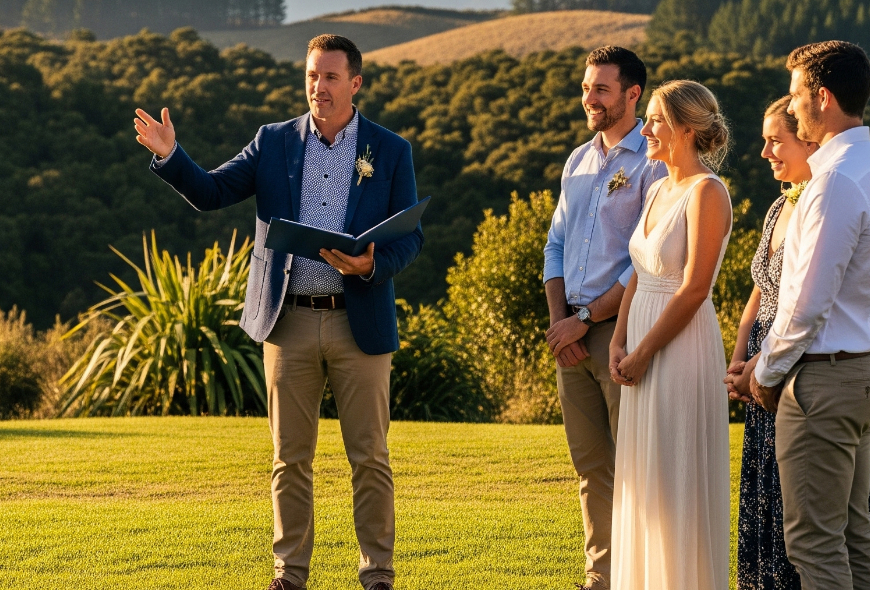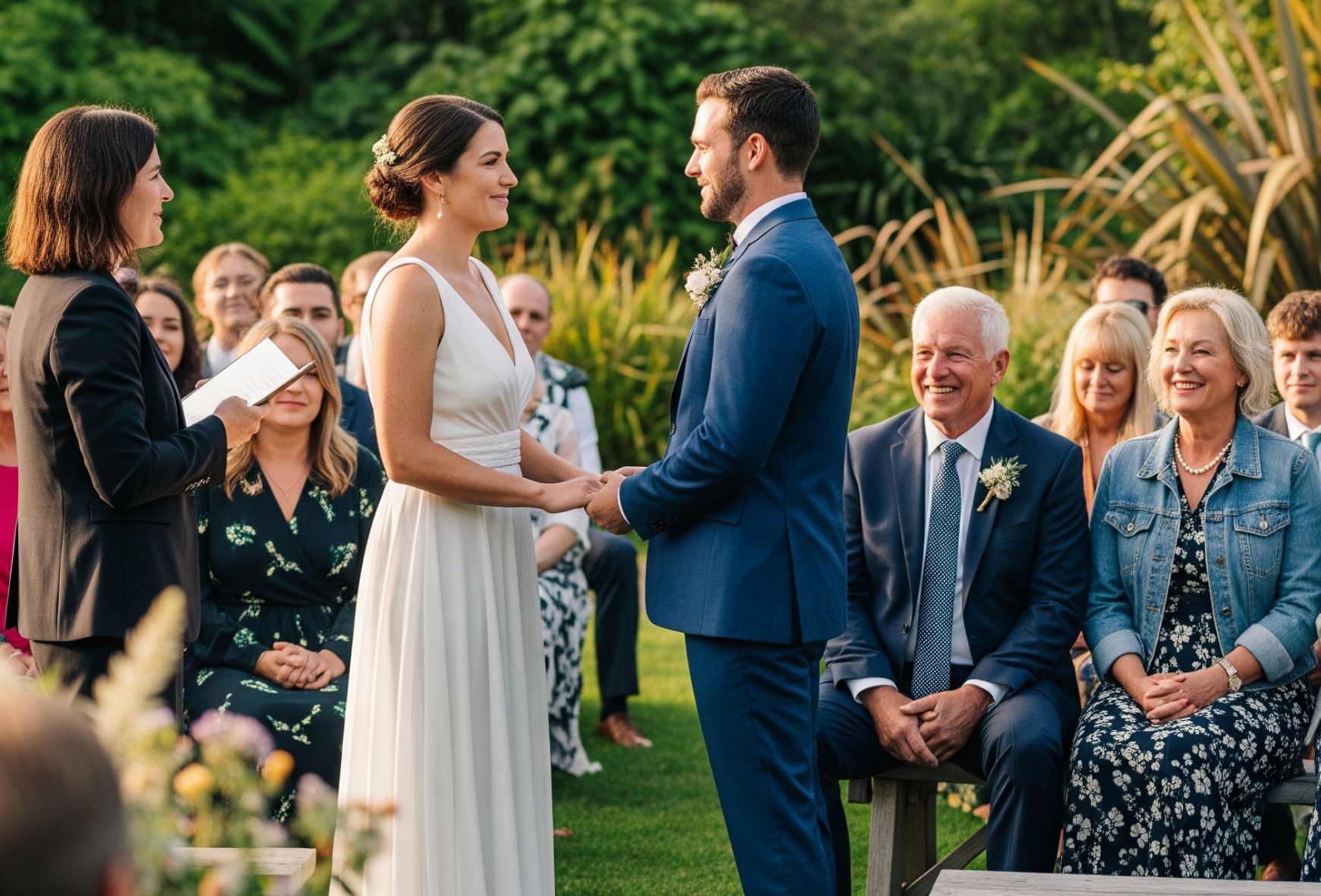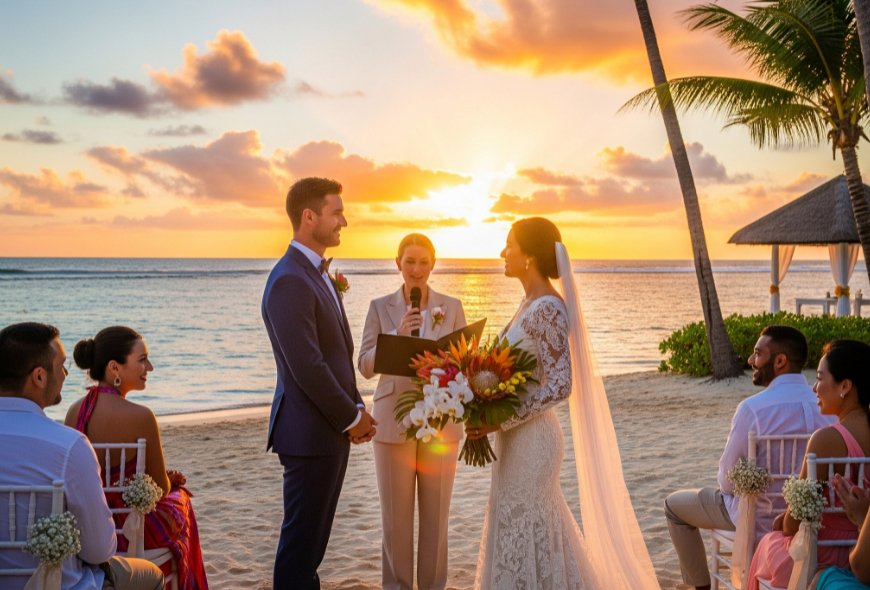
Planning your dream wedding in New Zealand? Whilst you've probably spent months perfecting every detail from your dress to the decorations, one crucial element that deserves equal attention is your wedding rehearsal. A well-organised rehearsal with your marriage celebrant can be the difference between a smooth, confident ceremony and one filled with awkward pauses and uncertainty.
Why Wedding Rehearsals Matter
Your wedding rehearsal isn't just a nice-to-have—it's an essential part of ensuring your ceremony runs seamlessly. This practice run allows everyone involved to understand their roles, timing, and positioning, reducing nerves and preventing mishaps on your actual wedding day. For Kiwi couples, where outdoor ceremonies are particularly popular, rehearsals become even more important as you'll need to account for natural elements and venue-specific considerations.
Pre-Rehearsal Preparation
What Your Celebrant Should Discuss Beforehand
Before you even step foot at your venue, your celebrant should have covered several key points with you:
- Ceremony structure and flow - A complete runthrough of how your ceremony will unfold from start to finish
- Legal requirements - Ensuring all paperwork and witness arrangements are properly organised
- Personal touches - How your chosen vows, readings, or cultural elements will be incorporated
- Timeline expectations - Realistic timing for each segment of the ceremony
Documentation and Legal Bits
Your celebrant should have all necessary documents sorted well before the rehearsal, including your Notice of Intended Marriage and any special licence requirements. They should also confirm witness details and ensure everyone understands their legal responsibilities.
At the Venue: Essential Rehearsal Elements
Positioning and Movement
Your celebrant should guide everyone through:
- Processional order and spacing - Who walks when, where they stand, and how fast to move
- Ceremony positioning - Exact placement for the couple, celebrant, witnesses, and bridal party
- Microphone and sound logistics - If you're using amplification, testing levels and positioning
- Photography considerations - Ensuring positioning works well for your photographer's needs
Timing and Flow Practice
A thorough rehearsal should include:
- Complete ceremony run-through - From processional music to recessional
- Cue practice - When to exchange rings, when to kiss, when to sign documents
- Contingency planning - What to do if something goes wrong (wind, rain, or technical issues)
- Question and answer time - Addressing any concerns from the wedding party
New Zealand-Specific Considerations
Outdoor Ceremony Factors
Many Kiwi weddings take place in stunning outdoor locations, so your celebrant should address:
- Weather backup plans - Clear instructions for rain or strong wind scenarios
- Natural lighting considerations - How the ceremony might need to adjust based on sun position
- Ground conditions - Ensuring everyone knows how to navigate grass, sand, or uneven terrain in formal attire
Cultural Elements
If you're incorporating Māori traditions or other cultural elements, your celebrant should:
- Explain the significance - Ensuring all participants understand and respect the cultural components
- Practice special rituals - Whether it's a hongi, handfasting, or other traditional elements
- Coordinate timing - How cultural elements fit within the overall ceremony structure
Managing the Wedding Party
Roles and Responsibilities
Your celebrant should clearly outline:
- Best man and maid of honour duties - Ring handling, witness signing, and support roles
- Bridal party positioning - Where everyone stands and when they move
- Family involvement - If parents or other family members have special roles
- Children's roles - Special consideration for flower girls, page boys, or other young participants
Addressing Nerves and Questions
A good celebrant will:
- Create a relaxed atmosphere - Keeping the rehearsal light-hearted whilst still thorough
- Address individual concerns - Taking time to speak with nervous participants
- Provide reassurance - Reminding everyone that small mistakes are normal and easily managed
Technical and Practical Elements
Sound and Music Coordination
Your celebrant should coordinate with other vendors to ensure:
- Music cues are clear - When processional and recessional music starts and stops
- Microphone logistics - Who holds what, when, and how to handle equipment
- Volume levels - Ensuring everyone can be heard without overwhelming guests
Photography and Videography Integration
Working with your creative team, your celebrant should:
- Coordinate key moments - Ensuring photographers can capture important elements
- Manage positioning - Making sure the ceremony is visible from multiple angles
- Time special moments - Allowing appropriate time for ring exchanges and kisses
Final Rehearsal Checklist
Before wrapping up your rehearsal, ensure your celebrant has covered:
- Complete ceremony run-through from start to finish
- All participants know their positions and timing
- Contingency plans for weather or technical issues
- Ring exchange and signing logistics
- Music and sound coordination
- Photography positioning
- Any cultural or religious elements
- Final questions and concerns addressed
Red Flags: When Your Celebrant Isn't Prepared
Be concerned if your celebrant:
- Rushes through the rehearsal without attention to detail
- Seems unclear about legal requirements or ceremony structure
- Doesn't address weather contingencies for outdoor ceremonies
- Fails to coordinate with other vendors
- Dismisses questions or concerns from you or your wedding party
- Appears unprepared or disorganised
Making the Most of Your Rehearsal
To get the best from your rehearsal session:
- Arrive on time and prepared - Bring all key participants and any ceremony items
- Ask questions - Don't hesitate to clarify anything you're unsure about
- Practice problem scenarios - Run through what happens if someone drops rings or stumbles
- Stay relaxed - Remember, this is practice—your actual ceremony will be even better
Conclusion
A comprehensive wedding rehearsal with your celebrant is an investment in your perfect day. By ensuring all these elements are thoroughly covered, you'll walk down the aisle with confidence, knowing that every detail has been considered and practised. Your celebrant should be your guide and support system, helping create a ceremony that flows beautifully and reflects your unique love story.
Remember, this is your special day, and you deserve a celebrant who takes the time to make it absolutely perfect. Don't settle for anything less than thorough preparation and professional expertise.
Find your perfect Marriage Celebrant HERE 💍


